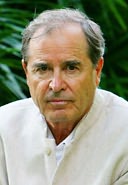- Shopping Bag ( 0 items )
From Barnes & Noble
"If there were an 'A-List' of living American travel writers," opined The Atlantic, "Paul Theroux's name would be at the top." The review went on to crediting him with revitalizing the travel writing genre with his The Great Railway Bazaar, praise echoed in several other accolades. Fortunately for us, Theroux is not content to sit at home in Cape Cod and Hawaii and rest on his laurels. In fact, in The Last Train to Zona Verde, he's off on what he calls his ultimate African safari. By ultimate, he does not mean luxurious; in fact, by train, bus, and cab, he goes where well-heeled westerners would never tread. (He also offers disarming views of Africans performing to tourists' expectations at luxury safari camps.) In prose both memorable and strikingly honest, Theroux captures a continent in flux and crisis.





Overview
A decade ago, Paul Theroux’s best-selling Dark Star Safari chronicled his epic overland voyage from Cairo to Cape Town, providing an insider’s look at modern Africa. Now, with The Last Train to Zona Verde, he returns to discover how Africa—and he—have changed in the ensuing years.
On this trip, Theroux is journeying through West Africa for the first time. From Cape Town, South Africa, to Namibia to Botswana, he covers nearly 2,500 miles before he is forced to give up what is to ...